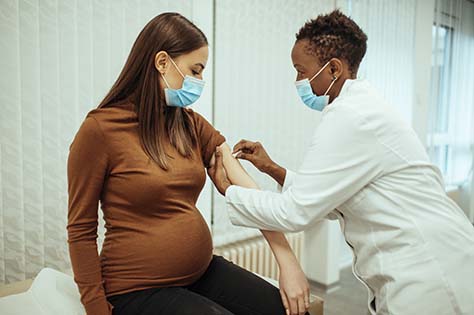What pregnant women need to know about the vaccine
Latest advise suggests pregnant women can have the vaccine

Despite pregnant women being advised against the Covid-19 vaccine initially, this advice has now changed, and they are now being offered the jab.
The latest advice, issued by the Joint Committee on Vaccination and Immunisation (JCVI) suggests that pregnant women should be offered the vaccine at the same time as the rest of the population, based on their age and clinical risk group.
There haven’t been any trials testing of the vaccine in pregnant and breastfeeding women as yet. Therefore, whether pregnant women have the vaccination is based on their choice to have it now or wait for further information about the vaccine in pregnancy.
Advice to help you make your decision
- Make sure you inform yourself about the vaccine and the risks of Covid-19 in pregnancy. Speak to your midwife, doctor or an immunisation nurse.
- Do your research on the NHS,
Public Health England
(PHE) or professional websites. Available evidence on the safety of vaccines in pregnancy is published by UKTIS
If I am offered a COVID-19 vaccine – what do I need to consider?
The Royal College of Obstetricians & Gynaecologists offers the following advice:
- If you are at higher risk of catching COVID-19, you should consider getting the vaccine
- If you are at higher risk of becoming seriously unwell if you do catch COVID-19, you should consider getting the vaccine
- You should discuss the risks and benefits of vaccination, including possible side effects of the different vaccines, with a healthcare professional before making your final decision. If, after discussion, you choose to have a particular vaccine, then your healthcare professional will help to facilitate this choice.
Vaccination benefits
COVID-19 may be more dangerous in pregnancy
Studies have shown that hospital admission and severe illness may be more common in pregnant women (compared to those not pregnant), especially those in the third trimester of pregnancy, and that preterm birth is more likely (compared to pregnant women without COVID-19). Pregnant women with underlying medical conditions are at higher risk of severe illness.
Vaccination is effective in preventing COVID-19 infection
You cannot get COVID-19 from the vaccination
COVID-19 vaccines do NOT contain live coronavirus
Vaccines do NOT contain any additional ingredients that are harmful to pregnant women or their babies
Other non-live vaccines (whooping cough, influenza) are considered to be safe for pregnant women and their unborn babies.
COVID-19 vaccines have been given to large numbers of people to ensure they meet stringent standards of effectiveness and safety.
Vaccination risks
The COVID-19 vaccines have not yet been tested specifically in pregnant women.
There is still limited evidence for pregnant women. Monitoring from the United States, where nearly 90,000 pregnant women have had a COVID-19 vaccine (using Pfizer BioNTech or Moderna vaccines), has not raised any safety concerns. More information may come from studies in the future.
Future studies in pregnancy will give us more information on how effective the vaccine is in pregnancy, and on pregnancy outcomes after vaccination. There have not been any signals to suggest safety concerns so far.
Side effects from the vaccine are common.
These do not affect pregnancy, but may include:
- injection site reactions (sore arm)
- fatigue
- headache
- muscle pain
- fever, chills
- joint pain
If you decide to have a Covid-19 vaccine, please tell the vaccination team that you are pregnant so that this can be recorded.
There are some extremely rare but serious side effects associated with the vaccine including thrombosis (blood clots) which have been reported in relation to the AstraZeneca vaccine. The Pfizer BioNTech or Moderna vaccines should be offered to pregnant women where available as most of the safety monitoring data from the United States is specific to these two vaccines.
If you are unsure or want more information to make your decisions, speak to your midwife and other healthcare professionals to answer your questions.